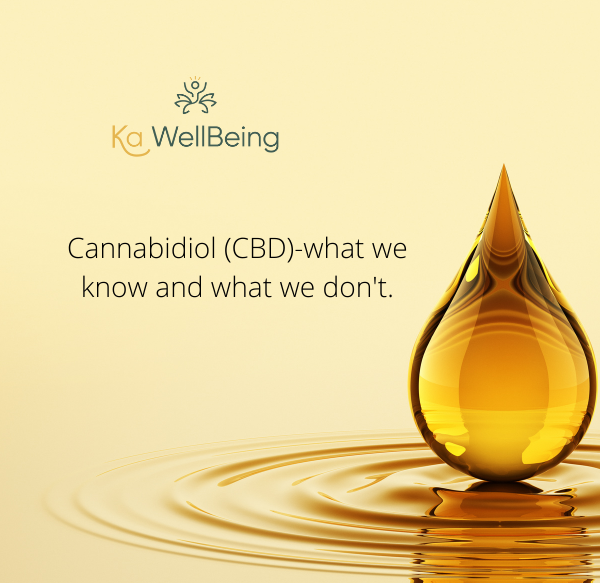Cannabidiol (CBD) is a naturally occurring compound found in the flower leaf and stems of cannabis, a hemp plant with a history as medicine going back thousands of years. Both CBD and THC have significant therapeutic attributes. CBD does not make a person feel “stoned”, high or intoxicated like the effects of THC. If you decide to try CBD, make sure you are getting it from a reputable source. And talk with your doctor to make sure that it won’t affect any other medicines you take. Cannabidiol (CBD) is often covered in the media, and you may see it touted as an add-in booster to your post-workout smoothie or morning coffee. But what exactly is CBD? And why is it so popular? How is cannabidiol different from marijuana, cannabis, and hemp?
CBD or cannabidiol does not cause a “high” by itself.
According to a report from the World Health Organization, “In humans, CBD exhibits no effects indicative of any abuse or dependence potential…. To date, there is no evidence of public health-related problems associated with the use of pure CBD.” Cannabidiol is the second most prevalent active ingredient in cannabis (marijuana). While CBD is an essential component of medical marijuana, it is derived directly from the hemp plant, a cousin of marijuana, or manufactured in a laboratory.
Is cannabidiol legal?
CBD is easily obtainable in most parts of the United States, though its exact legal status has been in change. All 50 states have laws legalizing CBD with differing degrees of restriction. In December 2015, the FDA reduced the regulatory requirements to consent researchers to conduct CBD trials. In 2018, the Farm Bill made hemp legal in the United States, making it virtually impossible to keep CBD illegal.
The Farm Bill eliminated all hemp-derived products, including CBD, from the Controlled Substances Act, which criminalizes the possession of drugs. This means that CBD is legal if it comes from hemp, but not if it comes from cannabis (marijuana) – even though it is the precise same molecule.
The evidence for cannabidiol health benefits
CBD has been publicized for an extensive variety of health issues, but the most solid scientific evidence is for its effectiveness in treating some of the cruelest childhood epilepsy syndromes, such as Dravet syndrome and Lennox-Gastaut syndrome (LGS), which typically don’t respond to antiseizure medications. In numerous studies, CBD was able to reduce the number of seizures, and, in some cases, stop them altogether.
Scientific evidence, and self-reports or research in humans, suggest CBD may also help with:
Insomnia. Studies suggest that CBD may help with both falling asleep and staying asleep.
Chronic pain. Additional human studies are needed to substantiate claims that CBD helps control pain. One animal study from the European Journal of Pain suggests CBD could help lower pain and inflammation due to arthritis when applied to the skin. Other research identifies how CBD may inhibit inflammatory and neuropathic pain, which are a difficult treat.
Addiction. Animal models of addiction suggest it may also help lessen cravings for alcohol, cannabis, opiates, and stimulants. CBD can help lower cravings for tobacco and heroin under certain conditions, according to some research in humans.
Anxiety. Even though we need more research, a 2015 medical journal review article looked at CBD and its effect on multiple anxiety disorders, including generalized anxiety disorder, seasonal affective disorder, panic disorder, and post-traumatic stress disorder. Studies and clinical trials are exploring the common report that CBD can reduce anxiety.
Is CBD safe?
If you’re considering using CBD, be aware that there are many products on the market and that quality can vary. One way to choose wisely is to look for products from states that have legalized both the medical and recreational use of cannabis; they tend to have stricter standards.
A significant safety concern with CBD is that it is primarily marketed and sold as a supplement, not a medication. Currently, the FDA does not regulate the safety and purity of dietary supplements. So, you cannot be sure that the product you buy has active ingredients at the dose listed on the label. In addition, the product may contain other unknown elements. We also don’t know the most effective therapeutic dose of CBD for any particular medical condition. People taking high doses of CBD may show abnormalities in liver-related blood tests. Many non-prescription drugs, such as acetaminophen (Tylenol), have this same effect. So, you should let your doctor know if you are regularly using CBD. Side effects of CBD may include nausea, fatigue, and irritability. CBD can increase the level of blood thinning and other medicines in your blood by competing for the liver enzymes that break down these drugs. Grapefruit has a similar effect with certain medicines.
How can CBD be taken?
CBD comes in many forms, including oils, extracts, capsules, patches, vapes, and topical preparations for use on the skin. If you’re hoping to reduce inflammation and relieve muscle and joint pain, a topical CBD-infused oil, lotion, or cream – or even a bath bomb — may be the best option. Alternatively, a CBC patch or a tincture or spray designed to be placed under the tongue allows CBD to directly enter the bloodstream.
CBD false or indefensible claims
Unfortunately, some CBD manufacturers have claims, such that CBD is a cure-all for cancer or COVID-19, which it is not true. We need more research, but CBD may prove to be a helpful, relatively non-toxic option for managing anxiety, insomnia, and chronic pain. Without sufficient high-quality evidence in human studies, we can’t pinpoint effective doses, and because CBD currently is typically available as an unregulated supplement, it’s hard to know exactly what you are getting.
If you have any questions?
Please call or text 787-362-8080
info@kawellbeing.com


